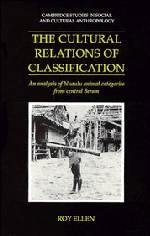Book contents
- Frontmatter
- Contents
- List of illustrations
- List of tables
- Preface
- List of abbreviations
- A note on orthography
- 1 Introduction
- 2 The language of classification
- 3 Processes of identification and the structure of categories
- 4 The relations between non-basic categories
- 5 Consistency, sharing and flexibility
- 6 Social intrusions and cultural styles
- 7 Changes in classifying behaviour
- 8 Cognition and the cultural relations of prehension
- Appendix 1 Checklist of terrestrial mammal fauna (excluding bats) recorded in the Nuaulu region of south central Seram, 1970–75
- Appendix 2 Checklist of bats (CHIROPTERA) recorded in the Nuaulu region of south central Seram, 1970–75
- Appendix 3 Checklist of birds recorded in and around the Nuaulu region of south central Seram, 1970–75
- Appendix 4 Checklist of testudines recorded for the Nuaulu area of south central Seram, 1970–75
- Appendix 5 Checklist of lizards and related forms recorded for the Nuaulu area of south central Seram, 1970–75
- Appendix 6 Checklist of snakes recorded in the Nuaulu region of south central Seram, 1970–75
- Appendix 7 Checklist of amphibians recorded in the Nuaulu region of south central Seram, 1970–75
- Appendix 8 Checklist of fishes and marine mammals recorded in and around the Nuaulu region of south central Seram, 1970–75
- Appendix 9 Checklist of insects recorded in the Nuaulu region of south central Seram, 1970–75
- Appendix 10 Checklist of molluscs recorded in the Nuaulu region of south central Seram, 1970–75
- Appendix 11 Checklist of Crustacea recorded in the Nuaulu region of south central Seram, 1970–75
- Appendix 12 Checklist of Arachnid specimens recorded in the Nuaulu region of south central Seram, 1970–75
- Appendix 13 Checklist of annelids, echinoderms, myriapods and related forms featuring in Nuaulu terminology and knowledge, 1970–75
- Notes
- References
- Author index
- Subject index
- Index of Nuaulu animal names
- Index of scientific names for animal species mentioned in the text
- Cambridge Studies in Social and Cultural Anthropology
5 - Consistency, sharing and flexibility
Published online by Cambridge University Press: 06 January 2010
- Frontmatter
- Contents
- List of illustrations
- List of tables
- Preface
- List of abbreviations
- A note on orthography
- 1 Introduction
- 2 The language of classification
- 3 Processes of identification and the structure of categories
- 4 The relations between non-basic categories
- 5 Consistency, sharing and flexibility
- 6 Social intrusions and cultural styles
- 7 Changes in classifying behaviour
- 8 Cognition and the cultural relations of prehension
- Appendix 1 Checklist of terrestrial mammal fauna (excluding bats) recorded in the Nuaulu region of south central Seram, 1970–75
- Appendix 2 Checklist of bats (CHIROPTERA) recorded in the Nuaulu region of south central Seram, 1970–75
- Appendix 3 Checklist of birds recorded in and around the Nuaulu region of south central Seram, 1970–75
- Appendix 4 Checklist of testudines recorded for the Nuaulu area of south central Seram, 1970–75
- Appendix 5 Checklist of lizards and related forms recorded for the Nuaulu area of south central Seram, 1970–75
- Appendix 6 Checklist of snakes recorded in the Nuaulu region of south central Seram, 1970–75
- Appendix 7 Checklist of amphibians recorded in the Nuaulu region of south central Seram, 1970–75
- Appendix 8 Checklist of fishes and marine mammals recorded in and around the Nuaulu region of south central Seram, 1970–75
- Appendix 9 Checklist of insects recorded in the Nuaulu region of south central Seram, 1970–75
- Appendix 10 Checklist of molluscs recorded in the Nuaulu region of south central Seram, 1970–75
- Appendix 11 Checklist of Crustacea recorded in the Nuaulu region of south central Seram, 1970–75
- Appendix 12 Checklist of Arachnid specimens recorded in the Nuaulu region of south central Seram, 1970–75
- Appendix 13 Checklist of annelids, echinoderms, myriapods and related forms featuring in Nuaulu terminology and knowledge, 1970–75
- Notes
- References
- Author index
- Subject index
- Index of Nuaulu animal names
- Index of scientific names for animal species mentioned in the text
- Cambridge Studies in Social and Cultural Anthropology
Summary
Like everything else interesting, classifying involves judgement, and in matters of judgement even men of good will can disagree
[Knight, 1981: 27].Introduction
Despite some determined efforts to eliminate him, must published reports on ethnobiology still list folk categories and classificatory constructs on the basis of the hypothetical omniscient ‘speaker–hearer’. Much the same is true for the ethnographic analysis of any kind of category. This non-existent figure has the distinction of possessing a maximum knowledge of the corpus under examination, the sum total of the knowledges of all persons consulted, without reflecting the practical (and generally partial) knowledge of individuals or indicating the dimensions and degree of variation. Yet if data are assembled using this heuristic device, they will always be in excess of those pragmatic competences common to all individuals. Moreover, they will not reveal unique abilities or those shared by only part of the population. These are matters which may be of considerable sociological significance. So, since there is a large area with an uneven range of abilities, and since no techniques of elicitation are ever completely exhaustive, variation must be expected from any corpus, even if the data provide no means of revealing it.
There are a few early references in the ethnobiological literature to variation between individuals and between groups [Henderson and Harrington, 1914: 8].
- Type
- Chapter
- Information
- The Cultural Relations of ClassificationAn Analysis of Nuaulu Animal Categories from Central Seram, pp. 126 - 148Publisher: Cambridge University PressPrint publication year: 1993



